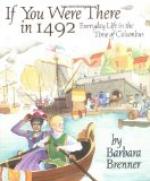Contention with Roldan.
After great trouble and many attempts at agreement, in which mention is more than once made of slaves, the dispute between Roldan’s party, rebels they might almost be called, and Columbus, was at last, after two years’ negotiation, brought to a close. Roldan kept his chief-justiceship; and his friends received lands and slaves. It brings to mind the conclusion of many a long war in the old world, in which two great powers have been contending against each other, with several small powers on each side, the latter being either ruined in the course of the war, or sacrificed at the end. The admiral gave repartimientos to those followers of Roldan who chose to stay in the island, which were constituted in the following manner. The admiral placed under such a caciqne so many thousand matas (shoots of the cazabi), or, which came to the same thing, so many thousand montones (small mounds a foot and a half high, and ten or twelve feet round, on each of which a cazabi shoot was planted); and Columbus then ordered that the cacique or his people should till these lands for whomsoever they were assigned to. The repartimiento had now grown to its second state—not lands only, but lands and the tillage of them. We shall yet find that there is a further step in this matter, before the repartimiento assumes its utmost development. It seems, too, that in addition to these repartimientos, Columbus gave slaves to those partizans of Roldan who stayed in the island. Others of Roldan’s followers, fifteen in number, chose to return to Spain; they received a certain number of slaves, some one, some two, some three; and the admiral sent them home in two vessels which left the port of St. Domingo at the beginning of October, 1499.
The queen’s Anger; partial release of slaves.
On the arrival in Spain of these vessels, the Queen was in the highest degree angered by the above proceedings, and said that the admiral had received no authority from her to give her vassals to anyone. She accordingly commanded proclamation to be made at Seville, Granada, and other places, that all persons who were in possession of Indians, given to them by the admiral, should, under pain of death, send those Indians back to Hispaniola, “and that particularly they should send back those Indians, and not the others who had been brought before, because she was informed that the others had been taken in just war.” The former part of this proclamation has been frequently alluded to, and no doubt it deserves much praise; but from the latter part it is clear that there were some Indians who could justly, according to Queen Isabella, be made slaves. By this time, therefore, at any rate the question had been solved, whether by the learned in the law, theologians and canonists, I know not, but certainly in practice, that the Indians taken in war could be made slaves. The whole of this




